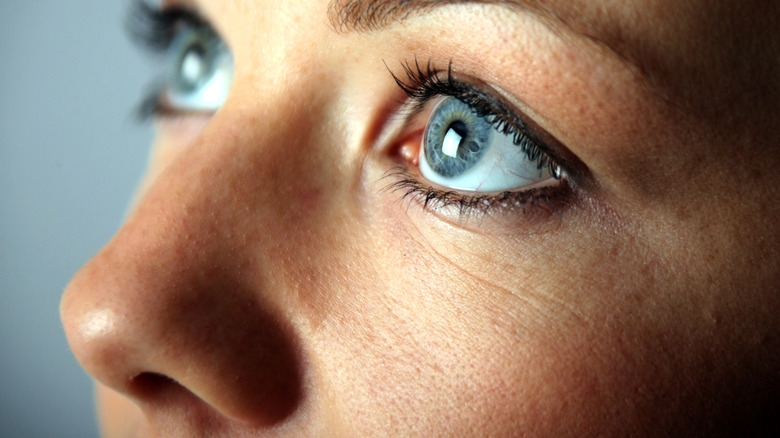Eat This Unexpected Protein To Improve Your Eye Health
In today's screen-centric environment, prioritizing your eye health is essential. Staring at screens all day can lead to eye strain, so it's important to take breaks from them every 20 minutes. Ultraviolet rays not only damage your skin but also your eyes. Wearing sunglasses can protect your eyes from developing cataracts or age-related macular degeneration. If you wear eye makeup, it's a good idea to toss any old mascaras, eyeliners, or brushes that could have bacteria that could give you an eye infection (per True Eye Experts).
According to AARP, moderate exercise can protect your eyes from cataracts and possibly lower your risk of glaucoma. Losing sleep might make your eyes puffy and red, but you could develop dry eyes or blurred vision when your eyes don't get enough rest. Your eyes produce fewer tears after age 50, so it's good practice to keep them moisturized by using lubricating eye drops.
According to Healthline, your diet can also play a role in reducing your risk of eye conditions such as cataracts, age-related macular degeneration, and dry eyes. You'll need to pay close attention to foods rich in antioxidants, certain vitamins, and zinc. You'll find these nutrients in yogurt.
Yogurt has vitamin A and zinc for eye health
Vitamin A ensures that your light-sensing retina functions properly and also protects your retina and overall vision, according to Providence Eye & Laser Specialists. If you don't get enough vitamin A, you could be at risk for eye infections, dry eyes, or eye inflammation. A 6-ounce container of plain, low-fat yogurt has 88 IU of vitamin A.
Your eyes have a high concentration of zinc in them, particularly in the retina-choroid complex, according to a 2019 article in Molecular Nutrition and Food Research. When you age, levels of zinc in your eyes decrease, which might lead to eye diseases such as age-related macular degeneration (AMD). Supplementing your diet with zinc could prevent the progression of AMD. Zinc might also reduce inflammation in the retina, and yogurt has 1.5 milligrams of vitamin A.
A 2019 study in the European Journal of Nutrition investigated the link between dairy consumption and the risk of cataracts in people who had a high risk of cardiovascular disease. People who ate more nonfat yogurt had a significantly lower risk of developing cataracts.
Other foods that are good for eye health
Eggs have the antioxidant carotenoids zeaxanthin and lutein that protect the retina and can reduce vision loss associated with age, according to Optical In Sight. Carrots give you beta-carotene; this not only enhances your vision, but when beta-carotene is converted to vitamin A, it also keeps the moisture in your eyes and protects them from germs. The oleic acid in avocados reduces eye inflammation, and avocados also have lutein and zeaxanthin. Your eyes also need omega-3 fatty acids to protect them from macular degeneration and damage. You'll find these healthy omega-3s in nuts, seeds, and fatty fish. Fatty fish is also high in protein, which helps protect your eyes from bacteria, viruses, and toxins.
According to the American Academy of Ophthalmology, too much sugar in your diet can be bad for your eyes, especially if you're at risk for type 2 diabetes or macular degeneration. Eating foods lower on the glycemic index, such as oatmeal, brown rice, or whole-grain breads, can prevent blood sugar spikes that could lead to vision loss.
For overall eye health, the Macular Degeneration Association says the Mediterranean diet might prove beneficial. The plant-based Mediterranean diet emphasizes fruits, vegetables, nuts, seeds, and whole grains while limiting red meat. Yogurt, eggs, and other dairy are allowed in moderation.


